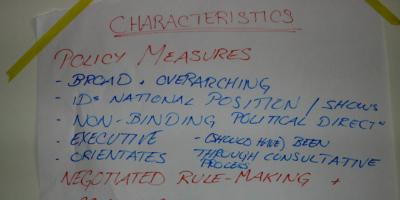
This July as every late July, many Romans fled their city. In their place came hundreds of thousands of international visitors. For the overwhelming majority, the trip was about relaxation; for others, it was about studying and a sense of public mission. Such was the case for 15 lawyers from the Bahamas, Cameroon, DR Congo, Ethiopia, Jamaica, Kenya, Malawi, Mozambique, Namibia, Nigeria, Samoa, Suriname, Tonga, Uganda and Zimbabwe. All came to attend IDLO's inaugural course on 'Building Legal Frameworks to Implement the Nagoya Protocol'.
The Protocol, an addition to the UN Convention on Biological Diversity (CBD), calls for a radical shift: under it, countries must ensure that users of genetic resources – the raw materials for innovation in medicine, biotechnology, cosmetics, food and beverages – share the benefits fairly and equitably with the countries and communities which provide them.
Just two weeks before the course began, on July 11, the Protocol had received its 50th ratification. It was the milestone needed for the text to come into force – an occasion hailed by UN Secretary-General Ban Ki-moon as a 'significant contribution to the post-2015 sustainable development agenda'.
IDLO's course, sponsored by the ABS Capacity Development Initiative, aims to create a generation of experts, apt to guide their home countries in implementing what is a highly demanding text. The scope of the task was evident in the questions asked.
One student from Zimbabwe noted that the Protocol's challenges cut across sectors, from intellectual property and the rights of indigenous peoples to environmental protection and natural resource management. She called for answers on how to strengthen coordination mechanisms among the government ministries responsible for the Protocol's various components. A Bahamian colleague inquired about the means to ascertain that benefit sharing reached the marginalized communities where genetic resources are commonly found. A Ugandan lawyer spoke of the difficulty of managing traditional knowledge; she wondered if new legal frameworks would be needed, or if amending current ones sufficed.
Of particular interest to participants was the research coordinated by IDLO and the Centre for International Sustainable Development Law (CISDL) to draw lessons from past country experiences. One such lesson is that with a challenge this new and transformative, no boilerplate legislation exists. The best approaches have been nationally tailored and largely empirical. Countries, however, are being advised to act now: the trick is to build legal frameworks flexible enough to accommodate changing conditions.
Which is why, participants heard, the old practice of bringing in international experts – people who draft laws, then leave – will not work. Countries need their own legal advisors to see them through their journey of implementation. But they also need global networks, so they keep learning from the experience of their peers.
For Andreas Drews of the ABS Capacity Development Initiative, the course was "exactly what we need. [...] What had been missing was exactly what happened here, a legal training focused on legal issues addressed to lawyers. It makes a big difference."

